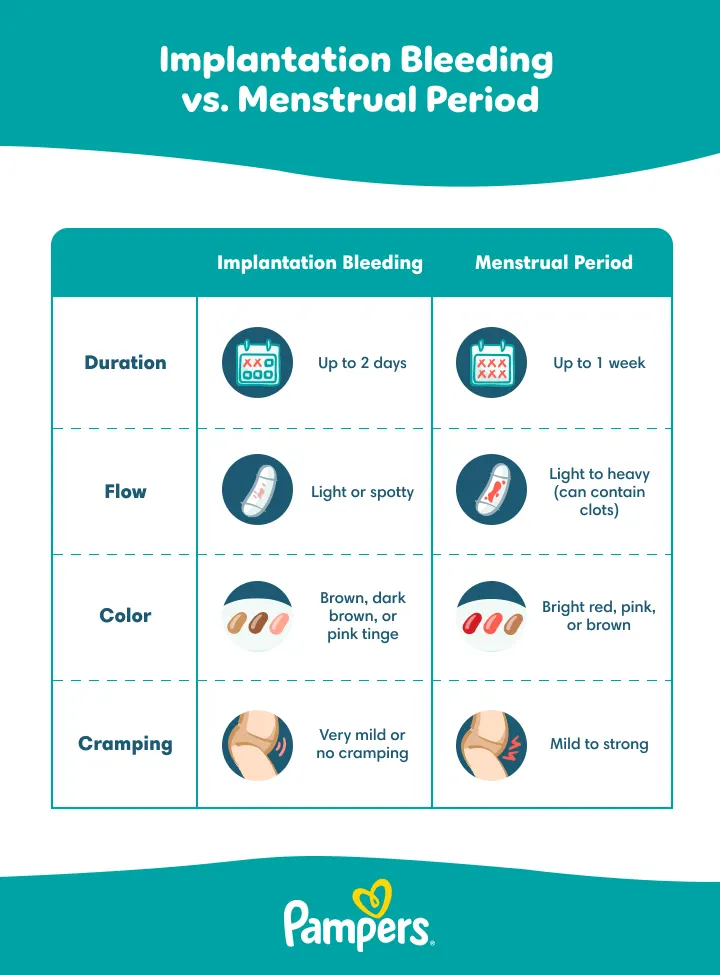What is Implantation Bleeding and What Are the Symptoms?
Implantation bleeding may very well be the first sign that you’re pregnant, as it’s a common and normal occurrence during the very early weeks of pregnancy. You might experience some light bleeding when implantation occurs, which is when the fertilized egg embeds itself into the uterus lining. Since your uterus has blood vessels, this action could cause this light bleeding, a totally normal part of the pregnancy process. Read on to learn more about implantation bleeding and answer questions like when does it happen, how long it might last, what it looks like and more.
What Is Implantation Bleeding and How Common Is It?
Implantation bleeding is a normal occurrence in early pregnancy. It’s a light spotting that may happen when implantation occurs—when a fertilized egg attaches to the wall of the uterus, where it can begin growing. This light bleeding happens because the lining of your uterus contains blood vessels and vascular tissue, so when the fertilized egg embeds itself into the wall, it can cause some of the lining to break away—hence the bleeding.
So, does everyone have implantation bleeding? Some may not experience implantation bleeding at all, while others may simply not notice it.
When Does Implantation Bleeding Occur?
If implantation bleeding does happen, this commonly occurs around 10 to 14 days after conception—when a fertilized egg becomes attached to the lining of your uterus.
So, does implantation bleeding mean you’re pregnant? In a word—yes! You can only experience implantation bleeding if a fertilized egg embeds itself into your uterus lining, which means you’re pregnant. Of course, you’ll want to test and talk to your healthcare provider to be sure.
If you’re wondering, “How long after sex does implantation bleeding occur?” keep in mind that conception may not happen on the same day you had sex. Sperm can live as long as five days inside the reproductive tract, and conception might not occur for several days after sex. So, if you experience light spotting after sex and you’re wondering, “Could I be pregnant?” Your spotting is likely due to something other than pregnancy. Consult with your healthcare provider for a diagnosis.
How Long Does Implantation Bleeding Last?
It’s common to wonder how long implantation bleeding can last—1 day, 3 days, 5 days? The duration of the bleeding can vary; however, it generally lasts from a few hours up to 2 days.
What Does Implantation Bleeding Look Like?
What are the signs and symptoms of implantation bleeding, and what does it look and feel like? If you experience this early sign of pregnancy, you could observe the following:
Light bleeding or small drops of blood from the vagina
A brownish discharge or spotting that is brown or pink
Bleeding or spotting that starts around the time your menstrual period usually starts and lasts from a few hours up to about two days.
If you’re concerned about any of your symptoms or you’re unsure whether you’re experiencing implantation bleeding or something else, consult your healthcare provider. Implantation bleeding doesn’t typically include cramps or heavy bleeding, so your healthcare provider can be a good resource when other symptoms are involved.
Implantation Bleeding vs. Your Period
It’s quite easy to mistake implantation bleeding for your menstrual period, as it often occurs around the same time that your period would’ve been due. There are some differences between implantation bleeding and a period to pay attention to, such as the amount of bleeding, the timing and the colour.
So, what colour is implantation bleeding, and can it be red? What does implantation bleeding look like, whether you notice it in the toilet or on your underwear? Does implantation bleeding have clots? Can implantation bleeding be heavy? Here is some advice on how to recognize implantation bleeding and discover whether you’re experiencing implantation bleeding or menstruation:
Implantation Bleeding | Menstrual Period |
|---|---|
Lasts up to 48 hours | Lasts up to a week |
Light or spotty bleeding (without clots) | Starts heavy and gradually gets lighter towards the end (can contain clots) |
Colour is brown, dark brown or with a pink tinge | Colour is bright red, pink or brown |
Very mild or no cramping | Cramping may start one or two days before bleeding (may occasionally be intense) |
As implantation bleeding is an early symptom of pregnancy, what you may also notice are some of the other positive signs, such as morning sickness, fatigue or sore breasts.
Implantation Bleeding and Pregnancy Tests?
If you think that you’re experiencing implantation bleeding rather than your period, you may wonder if you should take a pregnancy test. You can take a home pregnancy test during implantation bleeding, but if you test too early, you might get a negative result.
Here's why: The pregnancy hormone human chorionic gonadotropin (or hCG) detected by pregnancy tests only starts being produced in your body the moment the fertilized egg is implanted in the uterus—which is the trigger for implantation bleeding. That means it’s highly unlikely that you can get a positive pregnancy test before implantation. The earlier you take the test, the less hCG there is to detect, meaning that the test may not yet be accurate. If you’re wondering how long after implantation bleeding you can test, keep in mind that you’ll get a more accurate test result if you wait until after the first day of your missed period.
If you get a positive test result, you can schedule an appointment with your healthcare provider to confirm your pregnancy. And you can try out our Due Date Calculator for an estimate of when your little one will be born.
Should You See Your Healthcare Provider?
Implantation bleeding is generally nothing to be concerned about, but it’s a good idea to talk to your healthcare provider if you have any concerns or unexplained bleeding during pregnancy. Although light bleeding in early pregnancy can be normal, occasionally, there may be another issue that needs to be addressed.
FAQS AT A GLANCE
Although a positive pregnancy test is possible during implantation bleeding, it’s still very early, and your hCG levels are usually very low at this point.
You’re more likely to get an accurate test result if you wait until your implantation bleeding stops and after your first missed period.
The Bottom Line
Implantation bleeding is a normal occurrence that may happen during early pregnancy. When the fertilized egg attaches itself to the lining of your uterus, this may cause light and short-lived bleeding for some. It can occur anywhere from 10 to 14 days after conception and may last up to two days, though many may not even notice it. Understanding the signs and causes of implantation bleeding can help you better understand your body and fertility.
How We Wrote This Article The information in this article is based on the expert advice found in trusted medical and government sources, such as the American Academy of Pediatrics and the American College of Obstetricians and Gynecologists. You can find a full list of sources used for this article below. The content on this page should not replace professional medical advice. Always consult medical professionals for full diagnosis and treatment.
Join Pampers Club and get:







